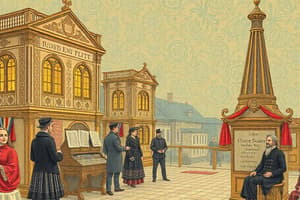Podcast
Questions and Answers
Which of the following best describes the relationship between early French sociology and the Enlightenment?
Which of the following best describes the relationship between early French sociology and the Enlightenment?
- Early French sociology was a complex mixture of both Enlightenment and anti-Enlightenment ideas. (correct)
- Early French sociology was solely a reaction against the Enlightenment.
- Early French sociology was entirely a continuation of Enlightenment ideals.
- Early French sociology completely ignored the Enlightenment.
According to the provided text, what did conservative thinkers emphasize as important components of social life, in contrast to what they saw as the overemphasis on rationality during the Enlightenment?
According to the provided text, what did conservative thinkers emphasize as important components of social life, in contrast to what they saw as the overemphasis on rationality during the Enlightenment?
- Universal human rights and equality
- Scientific progress and technological innovation
- Individual autonomy and personal freedom
- Tradition, emotion, and the non-rational aspects of social existence (correct)
What was Louis de Bonald's view of the role of individuals in shaping society?
What was Louis de Bonald's view of the role of individuals in shaping society?
- Individuals should focus on economic progress and material development.
- Individuals should be free to reshape society according to their will and reason.
- Individuals have a limited role in shaping society, as it is divinely created and should not be altered. (correct)
- Individuals should strive to reform society through revolution and radical change.
What assumption did conservative thinkers have regarding society? (Select the BEST answer)
What assumption did conservative thinkers have regarding society? (Select the BEST answer)
The text describes conservatives' views on societal change. Which statement aligns with their perspective?
The text describes conservatives' views on societal change. Which statement aligns with their perspective?
How did conservatives view institutions (e.g., family, religion) in society?
How did conservatives view institutions (e.g., family, religion) in society?
According to the provided text, what did conservatives fear regarding the rise of industrialization and urbanization?
According to the provided text, what did conservatives fear regarding the rise of industrialization and urbanization?
What was a key element emphasized by conservatives, that was often overlooked by Enlightenment thinkers?
What was a key element emphasized by conservatives, that was often overlooked by Enlightenment thinkers?
Based on the text, what was Henri de Saint-Simon's attitude toward the French Revolution?
Based on the text, what was Henri de Saint-Simon's attitude toward the French Revolution?
What was a key difference between Auguste Comte and thinkers like de Bonald and de Maistre?
What was a key difference between Auguste Comte and thinkers like de Bonald and de Maistre?
Flashcards
Conservative Reactions to Enlightenment
Conservative Reactions to Enlightenment
Critiques of the Enlightenment that emphasized emotions and tradition, advocating for societal order and cohesion.
Catholic Counter-Revolutionary Philosophy
Catholic Counter-Revolutionary Philosophy
A philosophical movement that opposed the French Revolution
Society over the individual
Society over the individual
Society is more than a collection of individuals; it is an entity with its own laws and deep roots in the past, shaping individuals through socialization.
Interconnected Parts of Society
Interconnected Parts of Society
Signup and view all the flashcards
Change is a Threat
Change is a Threat
Signup and view all the flashcards
Importance of Small Units
Importance of Small Units
Signup and view all the flashcards
Modern Social Changes
Modern Social Changes
Signup and view all the flashcards
Hierarchical System
Hierarchical System
Signup and view all the flashcards
Comte's Law of Three Stages
Comte's Law of Three Stages
Signup and view all the flashcards
Social Physics
Social Physics
Signup and view all the flashcards
Study Notes
- The French sociology was influenced by the Enlightenment movement.
- French sociology became rational, empirical, scientific, and transformative.
- Anti-Enlightenment ideology viewed the Enlightenment's liberalism in reverse.
- Critics of the Enlightenment harbored strong anti-modern sentiments.
- Sociology, encompassing French sociology, embodies a blend of Enlightenment and anti-Enlightenment ideas.
Conservative Reactions to Enlightenment
- The Catholic counter-revolutionary philosophy in France opposed Enlightenment ideas.
- Key figures in this opposition were Louis de Bonald (1754-1840) and Joseph de Maistre (1753-1821).
- Bonald and de Maistre opposed both the Enlightenment and the French Revolution.
- They viewed the revolution as an offspring of Enlightenment thinking.
- Bonald yearned for a return to the peace and harmony of the Middle Ages.
- Bonald considered God the origin of society, devaluing reason compared to traditional religious beliefs.
- Bonald believed society was created by God, so people should not alter this sacred creation.
- Bonald opposed anything that weakened traditional institutions like patriarchy, monogamous families, monarchy, and the Catholic Church.
- De Bonald's conservatism was extreme; calling it conservative is an understatement.
- Bonald's work served as a precursor to general conservative debates.
- Conservatives rejected the simplistic rationalism they attributed to the Enlightenment.
- They acknowledged irrational aspects of social life and valued them positively.
- Conservatives viewed tradition, imagination, emotion, and religion as beneficial and necessary for social life.
- Conservatives sought to maintain order and opposed turmoil.
- Conservatives lamented the French and Industrial Revolutions as disruptive forces.
- Conservatives emphasized social order, which remains a core theme in sociological theory.
- Zeitlin identified ten key propositions originating from the conservative reaction that shaped the foundation of French sociology.
Propositions Arising from Conservative Reaction
- While Enlightenment thinkers emphasized the individual, conservatives focused on society and broad social phenomena.
- They believed society is more than the sum of its individuals, possessing its own existence, laws, and roots in the past.
- Conservatives regarded society as the primary unit of analysis, shaping individuals through socialization.
- Conservatives downplayed the role of the individual as a basic element of society.
- They viewed society as composed of roles, positions, relationships, structures, and institutions, with individuals merely filling these units.
- Conservatives believed societal parts are interconnected and interdependent, which is a foundation of society.
- This view led them to a conservative political orientation, as they believed tampering with one part could harm others and disrupt society.
- Any social change should be approached cautiously.
- Conservatives viewed change as a threat to society, its components, and its individuals.
- They believed societal elements fulfill people's needs and disrupted institutions could harm people and lead to social disorder.
- Conservatives favored preserving key elements of society.
- They displayed less interest in the negative consequences of existing social structures and institutions.
- Smaller units like family, neighborhood, religious and occupational groups were seen as essential for society and individuals.
- These units provide intimate, face-to-face environments needed for people to survive in modern societies.
- Conservatives viewed modern social changes like industrialization, urbanization, and bureaucratization as disruptive.
- They feared these changes and sought ways to counter their harmful effects.
- Conservatives emphasized the importance of non-rational factors in life.
- Conservatives supported a hierarchical system in society and believed a ranking system of prestige and reward is important for society.
- These ten propositions formed the initial intellectual foundation for the development of sociology in France.
Synthesis of Enlightenment and Anti-Enlightenment Ideas
- Although some Enlightenment ideas, such as empiricism, influenced early sociological thought.
- Many conservative ideas found their way into this thought.
- While the separation between Enlightenment and anti-Enlightenment is emphasized, connections exist between the two.
- Anti-Enlightenment reaction built upon the scientific tradition developed by the Enlightenment.
- Anti-Enlightenment extended the Enlightenment's emphasis on collective phenomena.
- Both schools of thought focused on modern society and its negative effects on individuals.
- The foundation of sociology as a distinct discipline, emphasizing the works of Claude Saint-Simon, August Compte, and Emile Durkheim.
- All three are considered founders of sociology.
Claude Henri de Rouvroy, Count of Saint-Simon (1760-1825)
- Saint-Simon predates Aguste Comte.
- Comte served as Saint-Simon's secretary and disciple early in his career.
- Intellectual conflict led to their separation.
- Comte is generally considered a more important figure in the founding of society.
- Saint-Simon influenced both sociological and Marxist theory.
- He sought to preserve the existing social order, unlike Bonald and de Maistre.
- Saint-Simon was a positivist, advocating for the application of scientific methods to the study of social phenomena.
- He recognized the need for socialist reforms and centralized economic planning.
- He acknowledged capitalists replacing feudal aristocrats, but regarded the working class succeeding capitalists as unimaginable.
- Certain ideas from Saint-Simon were found in the works of Conte.
Auguste Comte (1798-1857)
- Comte was the first to coin the term "sociology".
- Comte was highly influential on early sociological theorists, including Herbert Spencer and Emile Durkheim.
- Compte believed that sociology should adopt a scientific approach.
- Comte's views are considered a reaction to the French Revolution and the Enlightenment, which he blamed for the revolution.
- Comte sought to counter the "negative and destructive philosophy" of the Enlightenment with his scientific approach "positivism".
- Comte was aligned with and influenced by French counter-revolutionary Catholics, particularly Bonald and de Maistre.
- Conte did not believe a return to the Middle Ages was possible because progress in science and industry had made it impossible.
- Conte developed a more complex and efficient theoretical to his predecessors, shaping early sociology.
- Conte created the term "social physics" to fight the negative and chaotic philosophies that had encompassed French society.
- Conte sought to align sociology with the exact sciences.
- He believed this new science should address both social stillness (existing social structures) and social dynamics (social change).
- He felt social dynamics was more important than social stillness.
- Conte's emphasis on change reveals his interest in social reform.
- Comte believed the natural evolution of society leads to an improved state.
- Reforms help this natural progress.
- Comte's law of three stages: theological, metaphysical, and positivist.
- Comte believed that the world goes through these three stages of thinking.
- The theological stage ended in 1300 AD, with the main system of thought based on belief in supernatural powers and religious forms.
- The metaphysical stage occurred approximately from 1300 to 1800 AD, characterized by abstract forces.
- In 1800, the positivist stage began, marked by belief in science. People sought to discover the laws governing those things.
- Comte focused on intellectual factors in his world theory and disorder in the existing social systems.
- He believed that only when positivism fully governed the world would social unrest cease.
- Conte was an elitist who was against social and political revolutions.
- He believed that the world needed more intellectual change.
- Conte's views included fundamental conservatism, reformism, scientism, and a theory of world evolution.
- Examples include Comte's focus on collective units, emphasis on both social structure and change, and emphasis on order.
- Conte also emphasizes the importance of agreement in society and the interconnected bonds between its elements.
- Comte valued sociological research and comparative historical analysis.
- Comte was elitist and believed that society should become a scientific force.
Comte's impact on the field of sociology
- Comte was a leader in the development of positivist sociology.
- In recent years many sociologists and scientific philosiphers questioned this.
- Empirical sociologists and social theorists continue to use it.
- Comte's positivism emphasized that the social world can be studied through abstract laws, tested through social data, and reveal natural relationships.
- Jonathan Turner is one of these theoristis.
- Modern thinking tends to question the rules that inform thought.
- A number of social scientist have drawn others to their cause.
Emile Durkeim (1858 - 1917)
- This movement had a negative influence on him.
- Like Comte he should be regarded as an inheritor of the conservative tradition.
- Made sociological accomplishments.
- His influence began a dominant role.
- Durkheim aopted a conservative political position.
- Durkheims work was influenced by social changes.
- Most of Durkeims work is devoted to examining social disorder.
- This social disorder is a necessary part of the new world.
- While Marx thought the issues were inherent, Durkheim did not.
- Interest in change of order.
- He defined the specific objectives of society.
Studying That Suits You
Use AI to generate personalized quizzes and flashcards to suit your learning preferences.




